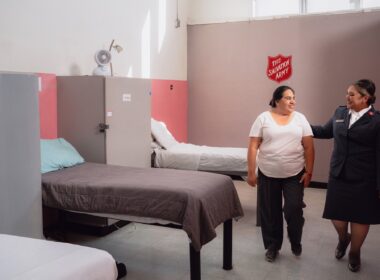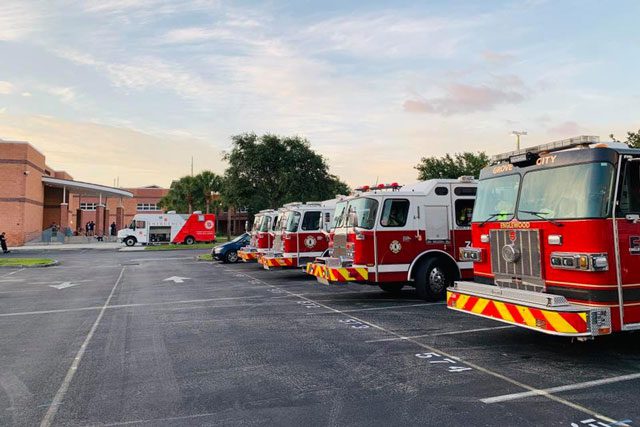From Strength to Strength

by Major Donald C. Bell –
Assistant National
Community Relations & Development Secretary
Lt. Colonel Paul Bollwahn ACSW National Social
Service Consultant
On January 20, 1997, President William Jefferson Clinton was inaugurated for a second term as president of the United States. The inauguration set the tone for reviewing where we have come from and where we are going both as a nation and within The Salvation Army as the Church of Jesus Christ.
In 1992, when Bill Clinton was running for the presidency, the Commissioners’ Conference set national goals for the Army entitled “From Strength to Strength…through the year 2000.” How are we measuring up? The goals and actuals through December 1995 are as follows:
Goal–To achieve a total of 165,000 junior and senior soldiers and adherents by the year 2000. Achievement–134,648 or 82 percent of the goal.
Goal–To achieve a total of 4,100 officers and auxiliary captains by the year 2000. Achievement–3,817 or 93 percent of the goal.
Goal–To achieve a total of 1,300 corps community centers (placing a major emphasis on ministry to ethnic groups by the year 2000). Achievement–1,264 or 97 percent of the goal.
Goal–To achieve a combined annual attendance of 10 million in Sunday school, holiness and salvation meetings by the year 2000. Achievement–8,587,140 or 86 percent of the goal.
Goal–To achieve a total of 22 million persons served in identified social services by the year 2000. Achievement–40 million people served or 182 percent of the goal.
The Lord has indeed blessed the Army as we move toward the next century. He has provided resources for which he will hold us accountable as we serve others in the coming days. He has blessed the United States as well.
In response to the electorate, President Clinton has laid his vision before the people–a vision that will have dramatic impact upon the Army, especially in the area of welfare and health. Under the new federal welfare laws, states will receive block grants to run their own systems. States will be responsible for setting their own welfare rules, for managing their own programs and for finding additional funds if necessary.
The key elements of this sweeping legislation are:
AFDC (Aid to Families with Dependent Children): is eliminated.Self Management: allows states to create and manage their own welfare programs;
Block Grants: mandates that block grants be sent from the federal government to the states; requires states to spend at least 80 percent of what they previously spent on welfare;
Additional Payment: provides extra money to states with high unemployment and rapidly growing populations;
Work Requirement: requires approximately half of all single mothers on welfare to be working or in “work related activities” by 2002 or lose some federal funds; requires states to reduce benefits to individuals who refuse to work;
Five-Year Limitation: ends aid to most recipients after five years, although, states can at their own expense give recipients benefits;
Bonus Payments: provides federal bonuses to those states that reduce illegitimacy rates, permits states to deny welfare payments to unwed mothers under age 18;
Food Stamps: cuts federal spending by $23 billion over the next six years;
Immigrants: makes them ineligible for most federal benefits, including Supplemental Security Income for the disabled and food stamps, until they become U.S. citizens or work in the United States for at least ten years; allows legal immigrants to participate in Head Start and some job training and educational programs; allows states to deny Medicaid to future legal immigrants;
Disabled Children: toughens qualification for receiving aid; and
Child-Support Enforcement: creates federal and state registers to track “deadbeat parents” and requires states to suspend driver’s licenses of those owing unpaid child support.
The unanswered questions are whether this new welfare system will be effective in reducing welfare rolls and how this will be done (i.e. simply making the application process much harder to discourage those eligible is not within the spirit of the reform laws). The risk is that reform will simply shift responsibility from the existing federal welfare bureaucracy and result in 50 state bureaucracies. Another alternative consists of redirecting funds that now go to government to private charitable nonprofit organizations. The Salvation Army’s history evidences concern for the human condition of each individual. Based upon the Bible, our human compassion focuses on the spiritual, social, emotional, psychological, and physical well-being of those we serve, and on opportunities for them to achieve their highest possible potential.
The Salvation Army stands ready in the process to receive this new block grant money and help in the process of welfare reform, and is in the process of developing policy along the following lines:
Welfare Reform and The Salvation Army
We affirm that governments exist to serve the needs of their citizens; therefore, it is our expectation that societal attitudes and government policies should:
Empower individuals to realize their dreams through honest effort, deliberate pursuit, and productive work;
Assist individuals to obtain and maintain a dignified quality of life when their own efforts or abilities fall short of achieving a basic level of living.
To achieve our expectation for government welfare programs, we believe that:
All government welfare programs should provide a continuum of services through which individuals are able to meet basic needs, including education and health care of children.
These programs and actives designed to assist individuals should assume appropriate interactive responsibility and accountability. A comprehensive continuum can best be achieved when governmental entities foster and maintain cooperative collaborative efforts among their various departments and with non-governmental social and charitable community agencies.
Also, we realize and support the fact that non-governmental social and charitable community agencies are obliged to participate in cooperative networking partnerships that result in the comprehensive deployment of accessible services.
As written in the constitution, states should be encouraged to exercise their sovereign authority for the benefit of their citizens. From this level, unique and tailored responses to regional, local and social conditions can be crafted. We believe the federal government should play an important role in assuring regional consistency and uniformity by establishing general, guiding principles.
Every able individual has a right and an obligation to be engaged in meaningful employment. Minimally, compensation for full time employment should allow persons to meet physical needs, acquire adequate and safe housing, and live at or above the poverty level with some benefits to protect against disruption of individual goals toward self-sufficiency. If jobs offering this modicum of lifestyle remain unavailable to a large segment of the population, innovative and comprehensive empowerment techniques cannot stem the tide of hopelessness and poverty.
Certainly, individuals who are not capable of self-maintenance are morally entitled to protection, care and services.
Government policy should seek to support, strengthen and maintain the family as a first priority. The family is the primary vehicle through which cultural and spiritual values, mores and attitudes are communicated and instilled. We see the healthy family as a catalyst for solving societal problems (e.g. poverty, violence, racial problems, substance abuse, unwanted pregnancy, divorce, child neglect, etc.).
Children need physical and emotional care. The family is charged with this responsibility. Absent parents are no less obligated to the emotional and physical well-being of their children than are custodial parents. Therefore, every effort should be exerted to assure that non-custodial parents fulfill their obligation of financial support to their children. When this is not possible or does not occur, the well-being of the children and the custodial parent should not be sacrificed.
When individual efforts do not enable people to maintain a basic standard of living, support services for further education/training or alternate means should be available. Client participation in this process is imperative.
Welfare reform will be realized as a process rather than an event. It will take time, and implementing the changes will take even more time. Therefore, the system’s policies, expectations, and relationships should be fully addressed and appropriately designed. The required changes should be implemented incrementally, to help ensure real reform.
The Concern
Changes in the welfare system will not automatically result in homelessness for every household whose benefits are affected. The changes will, however, increase the risk of homelessness for households already living on the brink. In fact, many people on welfare are already homeless. Approximately one-third of homeless women and children currently receive AFDC but cannot afford housing.
The Urban Institute, in Washington, released an analysis in July expressing fear that the fall-out of the new legislation could drive 1.4 million children into poverty. Ten percent of all families nationwide could lose income as a result of the legislation. Proponents of the new legislation describe its goals as:
Encouraging work;
Discouraging out-of-wedlock births.
We are concerned that provisions may punish low-income families that play by the rules: those who work and marry. For example:
Unachievable work standards–the number of jobs, the readiness of the prospective applicants, and pay necessary for family survival.Inadequate child care provisions.
Inadequate provision for increases in caseload by those outside the targeted never-married moms population.
What Will Happen
The first cuts will be felt by immigrants. The bill:
Prohibits non-citizens who are not U.S. military veterans or have not worked and paid taxes in America for at least 10 years from any SSI or food stamp benefits. Also prohibits future legal immigrants who are not citizens from receiving most federal benefits during their first five years in the country.
Excludes illegal aliens from most federal means-tested benefits other than emergencies and cases of communicable disease. States could deny Medicaid benefits to non-citizens who arrive after the bill is enacted. (Non-profit charities will be permitted to render emergency assistance.)
The second impact will be the “squeeze.” States are already making eligibility harder. States will have windfall savings immediately because their federal block grants are based on caseload numbers of two years ago. Ultimately, the bill will fall short of adequately funding the programs. The hit will not be felt for five years. The concern here is what happens to people who get so frustrated with all the requirements (they will hit the charities).
Jobs–Not enough jobs that will appropriately sustain a family equal to the lost benefits. Not enough job training.
In the last 20 years the caseload increase has been marked by: 1) young, never-married moms, and 2) children of these moms. This group, because of their lack of work skills, tends to stay on welfare a long time. It is very difficult to employ this group. A woman with two children, food stamps, WIC, medical and housing benefits garners an annual income of $13,000–$15,000. If she is paid minimum wage and has to supply her own day care, she can’t make it. Something must be done about this population. We strongly support tax credits as an incentive for transition to sustainable employment.

People by the way. What happens to women caring for chronically ill children or a disabled relative? This is the only piece of multiyear budget cutting legislation that exists. We are, indeed, balancing the budget on the backs of the poor. They take the hard hit. The Urban Institute indicated in July that 11 million families would suffer an average annual cutback of $1300–those who can least afford it. Two-thirds of the budget cutting will be borne by children.
What We Will Do
We will “open our doors” for one more. The Salvation Army never sees itself settling for anything less than attempting to service existing needs.
We are not “THE” answer. We are part of the answer. We will monitor local situations and work in partnership with our state welfare departments in designing a workable welfare program, i.e., that respects the dignity of all persons and offers a continuum of services that enables a viable transition to self-sufficiency.
We will continue as a strong voice mixed with action. We encourage our local unit to be active with local coalitions to seek partnerships with business and industry to increase availability to jobs and assist in job-readiness training. Much of our current programming with the dependent poor features emotional, spiritual and employment skills. All this is an effort to help individuals and families succeed at life.
Our new level of service gives us the opportunity to be comprehensive in our approach. Done appropriately, our contact with those seeking social services can introduce them to the entire cadre of corps ministry.
As The Salvation Army moves in the next century we walk in hand with the government to serve. May the bridge to the future be effective in lifting individuals from their circumstances and by providing basic human needs, lead- ing them into a spiritual relationship with Jesus Christ.










